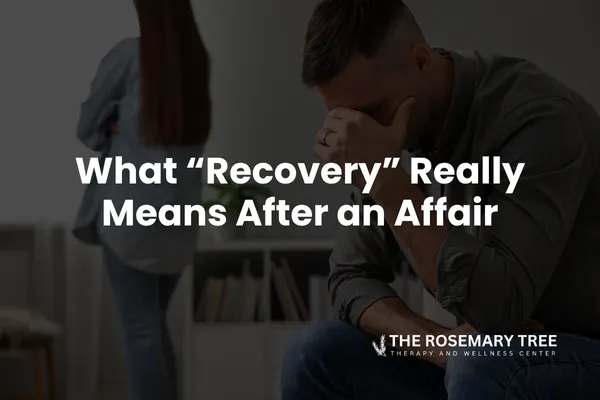
What “Recovery” Really Means After an Affair
Recovery Is Not About Forgetting
When an affair is discovered, most couples experience emotional shock. The betrayed partner feels grief, anger, confusion, and disbelief. The partner who strayed often feels guilt, shame, or fear that repair may be impossible.
Many couples begin therapy asking the same question: “How long will it take to get over this?”
The truth is, recovery isn’t about “getting over it.” It’s about rebuilding something new from the pieces of what was broken. Recovery after an affair doesn’t mean pretending it never happened. It means learning how to move forward in truth, safety, and connection.
The Three Phases of Affair Recovery
Every relationship that chooses to heal moves through similar stages, though the pace will differ for every couple.
1. Stabilization: Creating Emotional Safety
In the beginning, the goal is simply to feel safe again. Emotions are high and unpredictable. Both partners may need space and structure to manage conversations. This stage focuses on:
Calming the nervous system
Reducing reactivity and blame
Understanding what happened without rushing closure
This phase connects closely to what we covered in Creating Safety During Recovery. https://therosemarytree.org/post/creating-safety-in-the-wake-of-betrayal-where-healing-really-begins
Before deep repair can happen, stability must return.
2. Rebuilding: Restoring Trust and Communication
Once safety is established, couples begin the long process of rebuilding trust through consistent honesty, transparency, and empathy.
This includes:
Open communication about triggers and fears
Accountability without defensiveness
Reassurance through consistent action, not words
Learning to express pain without punishment
Rebuilding trust doesn’t happen overnight. It happens through repetition, care, and reliability.
3. Renewal: Creating Something New Together
The final phase isn’t about returning to the old relationship. It’s about creating a new one. Couples who reach this stage often describe it as deeper, more honest, and more emotionally connected than before.
Renewal looks like:
Emotional openness replacing avoidance
Intimacy built on mutual respect and vulnerability
A shared vision for the future, not one shaped by fear
Why Some Couples Struggle to Heal
Some couples stay stuck in repeating cycles of pain, often because they try to rebuild too quickly or without structure. Others confuse forgiveness with avoidance, moving forward without addressing the root cause.
Healing takes both time and intentional effort. Without guidance, couples may find themselves trapped in survival mode, where trust never fully returns.
That is where structured, guided therapy becomes invaluable.
How Accelerated Outcomes Therapy Helps Couples Recover
Our Accelerated Outcomes Therapy Intensives give couples the time and space traditional weekly therapy often cannot.
Instead of stopping just as the conversation deepens, intensives provide uninterrupted hours for understanding, accountability, and emotional repair.
During these intensives, couples can:
Process the discovery and impact of betrayal in a contained, safe environment
Learn new communication patterns that rebuild trust
Begin creating a roadmap for stability and reconnection
Move from shock and blame to clarity and direction
This focused time allows healing to happen faster and more deeply because both partners are fully engaged, supported, and guided every step of the way.
What Real Recovery Looks Like
Recovery doesn’t mean forgetting the past. It means learning to live with honesty, respect, and understanding.
It looks like:
Telling the truth, even when it’s hard
Listening without interrupting or defending
Expressing fear and pain without attacking
Offering reassurance instead of withdrawal
Recovery is less about what you say and more about how you show up. It’s built on small, daily moments of safety that add up over time.
Tying It All Together
The journey of healing after an affair often overlaps with everything we’ve explored across other series:
Betrayal Trauma helps name the pain. https://therosemarytree.org/post/betrayal-trauma-what-it-is-and-how-to-begin-healing-together
Attachment Work explains why it hurts so deeply.
Right-Sized Responsibility teaches balance and accountability.
Intimacy After Infidelity shows how closeness can safely return.
Together, they form the foundation of true recovery, not just surviving the affair, but rebuilding a relationship grounded in trust, safety, and respect.
Final Thoughts
Recovery after an affair is not about forgetting what happened. It’s about learning to live differently, with honesty, awareness, and compassion. It’s about creating something stronger and more real than before.
If you and your partner are ready to start rebuilding, we would be honored to help. You can reach out to us here, and our team will connect with you to talk about what this process could look like. There is no pressure, only care and a safe space to begin again.


